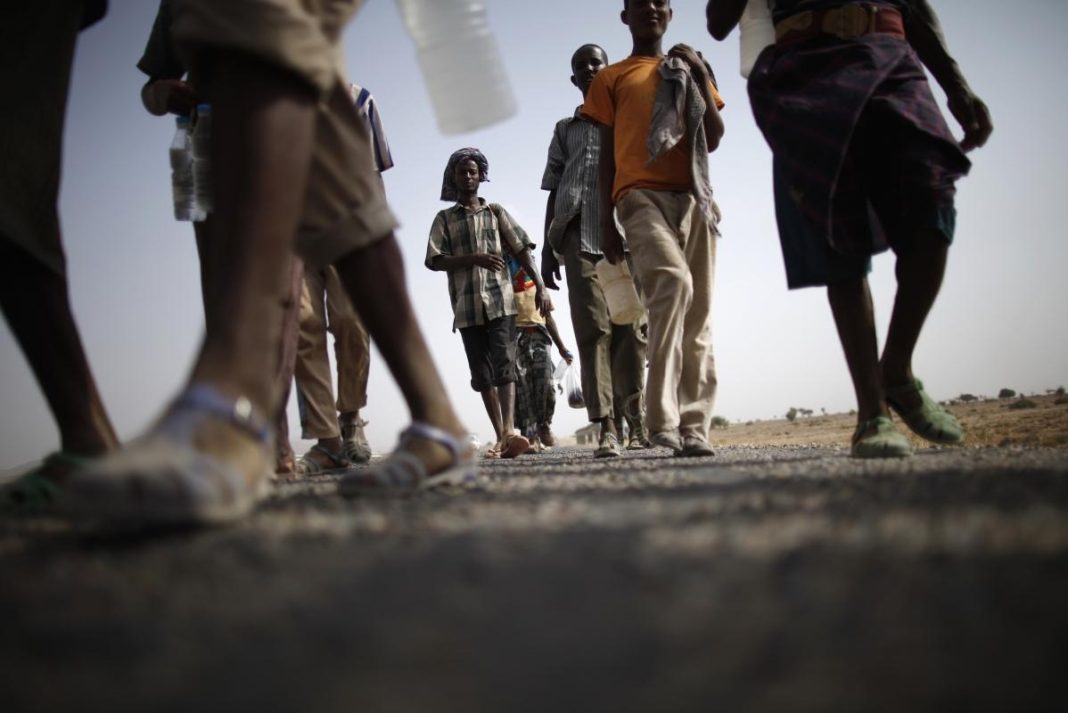HRW has documented, in a report made public on Monday, “widespread and systematic” abuses committed by Saudi border guards against mostly Ethiopian refugees who flee armed conflict, economic hardships and droughts in their homelands.
The nongovernmental New York-based organisation said hundreds, and likely thousands, have been murdered by Saudi border guards between March 2022 and June 2023, and killings are continuing.
Witnesses say they were targeted by firearms, explosives, and artillery and mortar shelling from Saudi border guards when trying to cross. Some saw dozens killed in front of their eyes, while others experienced serious injuries like amputations, or saw refugees arrested.
“I saw people killed in a way I have never imagined,” said Hamdiya, a 14-year-old girl who crossed the border in a group of 60 in February but was forced to go back to the Yemeni capital Sanaa after repeated attacks.
“I saw 30 killed people on the spot.”
A male minor interviewed by HRW stated border guards detained their group of five men and two 15-year-old girls after killing many others, and ordered the men to rape the girls. One man refused and was shot and killed on the spot.
“I participated in the rape, yes. To survive, I did it,” the boy continued, adding, “The girls survived because they didn’t refuse. This happened at the same spot where killings took place.”
“Saudi Arabia’s abuses against migrants and asylum seekers, committed historically and detailed more recently in this report, have been perpetrated with absolute impunity.”
“If committed as part of a Saudi government policy to murder migrants, these killings would be a crime against humanity,” HRW said in its report, for which it interviewed dozens of Ethiopians and analysed videos, photographs and satellite imagery.
Rights groups have documented abuses of refugees in Yemen by both the government and the Houthi armed group that took control of parts of the country since the war started in 2014 – and launched one of the world’s worst humanitarian crises – but HRW stressed the scale and intensity have only increased since.
East African refugees, predominantly Ethiopians, begin their arduous journey to Saudi Arabia by taking on the Eastern Route, also known as the Yemeni Route, which goes through Djibouti then by boat across the Gulf of Aden.
In Yemen, smugglers take them north by land, and the abuse begins.
HRW said a network of smugglers, traffickers and authorities have for years kidnapped, detained and beaten Ethiopian refugees in Yemen, and extorted them or their families – mostly displaced women and children in dire straits themselves – for money.
Female refugees are often at risk of being sexually assaulted by smugglers or other refugees, and two out of 10 interviewed by HRW said they became pregnant as a result.
Refugees are often taken to one of two makeshift “camps” on the Yemeni side of the border, separated by ethnicity, ostensibly for language purposes.
“There are no fewer than 50,000 people,” HRW quoted Berhe, an 18-year-old from southern Tigray as saying of al-Raqw camp where Tigrayan Ethiopians were taken. People interviewed by HRW confirmed that there were tens of thousands in the makeshift camps, waiting to cross into Saudi Arabia.
The crossing is a mountainous border separating Yemen’s Saada governorate and Saudi Arabia’s Jizan province, which is documented to be littered with land mines. Refugees travel in groups that could range from a handful of people to several hundred.
On the way, the refugees may be attacked with explosive weapons – including mortar projectiles – at times for hours on end, or days. The people who survive the attacks but do not manage to escape back into Yemen are detained by Saudi border guards.
While the exact numbers of people killed were difficult to document, survivors were able to give HRW the number of people who returned to the camps in Yemen, between 4 and 10 percent of those who had set out.
One of the people HRW interviewed said he had approached the border guards to retrieve the body of a girl from his village and found “her body was piled up on top of 20 bodies”.
The group called on Saudi Arabia to immediately and urgently revoke any policy to deliberately use lethal force on refugees, asked concerned governments to impose sanctions on Saudi and Houthi officials, and said the United Nations should establish an independent investigation into the killings and abuses.
